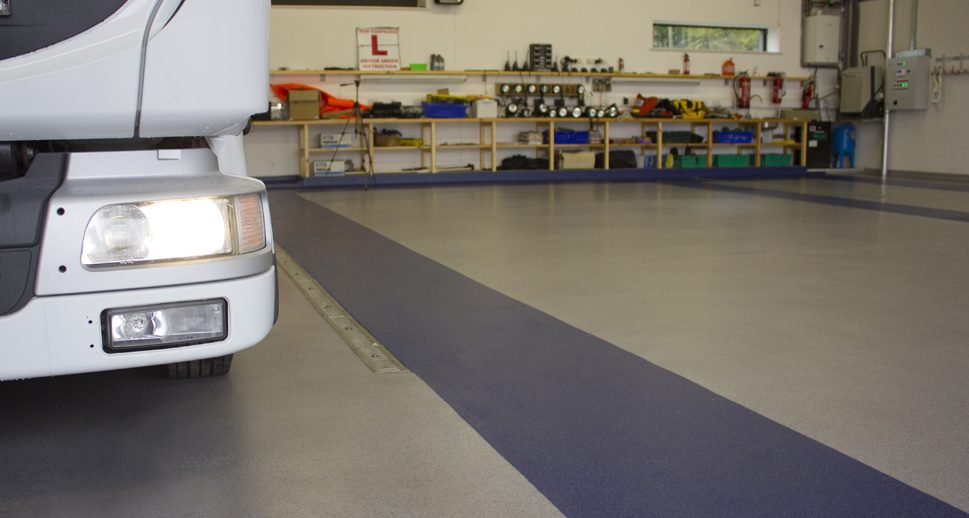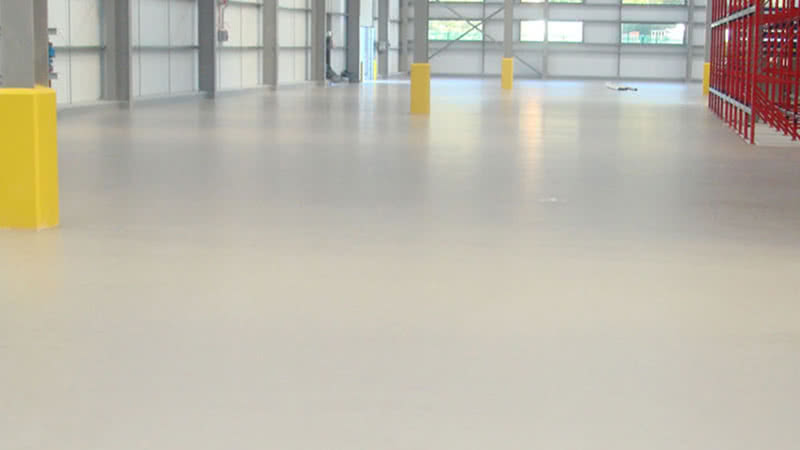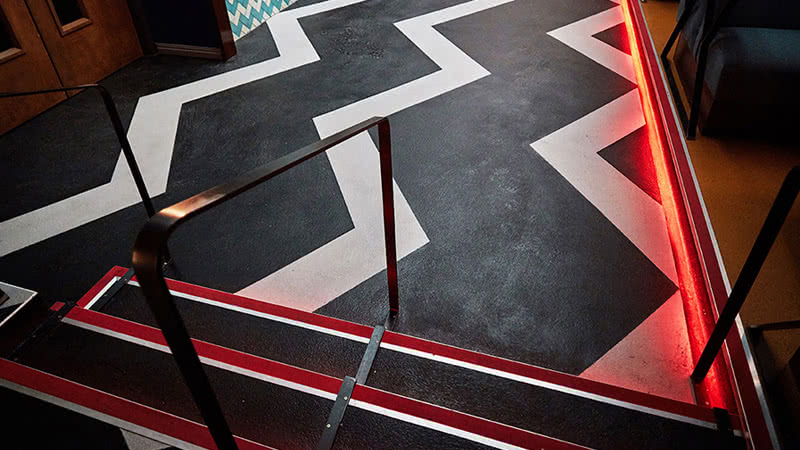Organisations across the UK are experiencing the commercial and operational benefits of resin flooring. Today’s resin floors are a significant improvement in performance and design from the days when resin was simply a protective topcoat for concrete industrial and commercial floors. Site owners and facility managers now have several types of resin flooring to choose from. Of these, PMMA resin flooring offers the most advanced benefits.
What is PMMA?
PMMA stands for polymethyl methacrylate, otherwise known as acrylic or acrylic glass, and is also referred to in the UK under the brand names Plexiglas, Lucite, Perspex, Acrylite and others. Thanks to its shatterproof properties, PMMA is often used as a glass substitute in building canopies, eyeglass lenses, signs, car headlights, aircraft windows, optical fibres and even touch screens for smartphones.
PMMA has a history dating back almost a century. As the synthetic polymer of methyl methacrylate, PMMA was first synthesised by chemists in 1928, and released onto the market in 1933 under the trademark Plexiglas. PMMA’s shatterproof properties saw it play a widespread role in World War II as safety glass. Subsequently, it was adapted for other uses in construction, automotive, engineering and medical industries, as well as recreational fields such as art, design and sport.
PMMA as a flooring solution
When methyl methacrylate resin in bulk liquid form is combined with a polymerization catalyst, the result is a hardened, extremely durable, impermeable PMMA object. This process, called acrylate resin casting, was adopted in the late 1940’s for use in industrial flooring and established a high-performance alternative to the more common epoxy and polyurethane commercial floors.
UK manufacturers and industries who choose PMMA resin as their flooring solution benefit from faster installation times and longer work lifespan, as well as a lower Total Cost of Ownership thanks to reduced maintenance and repair costs. PMMA can also be enhanced with a range of additives to boost desired attributes, such as chemical resistance.
PMMA resin flooring is found across a range of UK industries and locations, including food production, pharmaceutical manufacturing, retail, transport and logistics, sport and leisure centres, health clinics, schools and colleges, car parks and more. It offers each business the benefits of a strong, long-lasting surface that is impermeable, hygienic, anti-skid, low maintenance, and easy to repair.

Why choose PMMA Resin Flooring?
It’s tougher than the rest
PMMA hardens completely to give a remarkably durable, seamless surface that can withstand decades of heavy vehicle and foot traffic without lifting, cracking, wearing or fading. Moreover, PMMA resin is able to withstand a much greater temperature range than other resin flooring solutions, lending it to use in a wider variety of interior and exterior environments.
Improved resistance
PMMA resin delivers an impermeable finish that creates a tough barrier against bacteria and chemicals. That makes it ideal for pharmaceutical facilities, health and veterinary clinics, and food and beverage producers where hygiene is not just paramount but also a matter of UK Health and Safety compliance. PMMA resin floors can also withstand UV exposure over time and are high abrasion-resistant, anti-skid and invulnerable to most chemicals, including organic lactic acids that can corrode epoxy floors and sulfuric acids that degrade polyurethane floors.
Faster cure
PMMA’s standout feature is arguably its incredibly fast cure time. In some cases, PMMA can deliver a fully hardened industrial floor in as little as an hour. That allows business owners to install a floor overnight, thus reducing downtime, providing the installation is done professionally. Another benefit compared to epoxy and polyurethane, which must be removed and replaced completely when worn or damaged, is that PMMA can be repaired and recoated on an ongoing basis.

Easy to maintain
With its seamless, closed-pore finish, PMMA resin flooring is incredibly easy to clean as it creates an impenetrable barrier for dirt, dust or liquid. When repairs or modifications are required, PMMA can also be remoulded and refinished in situ, without the need for replacement. As a thermoplastic material, PMMA can be reverse-cured for upgrades or repairs in temperatures below 0°C, so if a fix is needed, it can be completed straight away.
Meets UK compliance and safety regulations
For UK businesses that have to meet stringent Health and Safety standards, PMMA resin floors offer the benefit of being customisable where resistance to specific chemicals is required. The anti-skid coating is also mandatory in several UK industries. PMMA meets the challenge with an anti-skid coating that typically lasts longer than other resin floorings, and can be reapplied quickly and easily. A closed pore, impermeable surface means bacteria and dirt don’t stick around, making it one of the most hygienic and compliant industrial resin flooring available.
Sustainable, environmentally friendly
PMMA resin flooring has a low carbon footprint, and no water is used to mix the resin it is In compliance with EU directive 2004/42/CE, which regulates air pollutants in the workplace.

Customised appearance available
PMMA resin flooring does not restrict site owners to as narrow aesthetic parameters as other varieties. PMMA can be mixed to any colour and incorporate a range of decorative finishes, such as patterns, flakes and even bespoke graphics, logos and branding. The material allows for high light transmission and can be up to 30% more reflective than tile, which can help brighten interiors and make them more attractive.
PMMA offers a range of benefits over traditional industrial flooring and commercial floor options. To learn more about PMMA resin flooring and the potential benefits of upgrading your business floors, contact our team today on +44 16 1775 2942 (UK).
Request a Quote
Please provide as much detail as possible about your specific needs & a member of our UK team will be in touch.
We do not install domestic flooring.